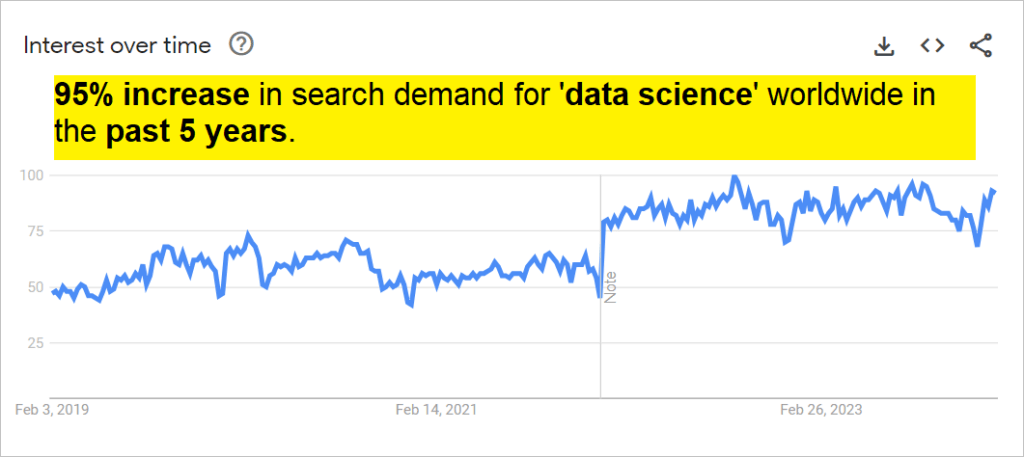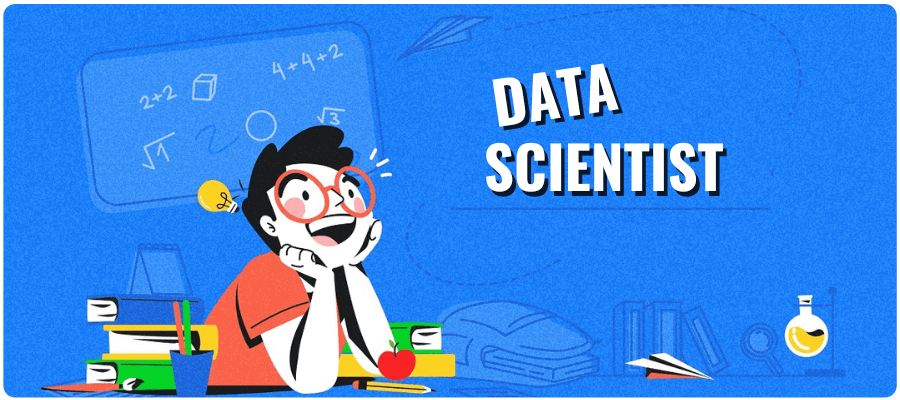The journey to becoming a data scientist requires strategic planning and dedication.
While the field offers promising career prospects with a projected 27.9% growth by 2026 according to the U.S. Bureau of Labor Statistics, success demands mastery of both technical and soft skills.
This comprehensive guide outlines the essential steps to launch your data science career in 2025, from educational requirements and skill development to practical experience through internships and certifications.
- What is Data Science?
- What does a data science engineer do?
- How to start your data science career
- Important data science skills to master
- Roles and Responsibilities of a data science engineer
- Is it hard to get a job as a Data Scientist?
- Is a career in data science worth it?
- Final Words
What is Data Science?
Data science is the field of study that combines subject-matter knowledge, mathematics, statistics, artificial intelligence, and computer engineering to draw out useful insights from data.
Data science’s primary purpose is to collect, process, analyse, and filter information from raw data.
Data science uses the most advanced hardware, programming languages, and algorithms to resolve data-related issues.
The future of artificial intelligence lies in it.
Simply expressed, data science is all about:
- Presenting the right questions and analyzing the raw data
- Using various advanced and effective algorithms to model the data
- Visualizing the data to gain a deeper understanding
- Understanding the data to find the final result and make better decisions
What Does a Data Science Engineer Do?
A data engineer is responsible for creating systems for gathering, validating, and preparing high-quality data. Data engineers collect and prepare the data, while data scientists use the data to support better business decisions.
The data engineer/ strategist’s job is to find and integrate new datasets that can be used to expand the functionality of the business and collaborate with the technical team to develop data products.
Relevant read: How long does it take to learn data science?
How To Start Your Data Science Career?
There are a few questions you should ask yourself before planning to pursue a career as a data scientist:
- Do you love statistics, numbers, and graphs? Data science is entirely based on Maths and statistics. If you don’t like math, statistics, and numbers this is a red flag for you. If you don’t like working with numbers, you will find your job frustrating later in your career.
- Before advancing to a justified data scientist position, are you willing to learn and work at the entry-level?
- Are you able to program easily? Data scientists should be comfortable using a variety of programming languages, including R and Python.
You can move forward and begin learning the data science abilities once you have a positive answer to the questions above.
Let’s take a look at the steps to Becoming a Data Scientist
Step 1. Get an undergraduate degree in data science
To become a data scientist, you must first get an undergraduate degree in data science or a closely related field.
Most employers will want to see a bachelor’s degree to hire you as a data scientist. Getting a bachelor’s degree in a field like data science, statistics, or computer science is an excellent way to get started in this profession.
A senior professional with a bachelor’s or master’s degree in IT/ computer engineering can pursue a career in data science by upgrading and retraining through online data science courses in the US.
Otherwise, if you’re looking for a data science boot camp, post-graduation course or master’s in data science, GreatLearning’s online data science courses are a good place to start.
Here are some of the latest data science courses that you can enroll:
👉 Find the latest data science job statistics.
Step 2. Develop your skill set
Even though a Bachelor’s degree may give you a theoretical understanding of the topic, it is important to brush up on your programming, technical, and non-technical skills.
Below are some of the most necessary skills you require for this job.
- Programming languages like Python, R, SQL, SAS, Java, Julia, JavaScript, Swift, Go, MATLAB, SAS
- Technical skills include machine learning, deep learning, processing large data sets, data visualization, data wrangling, statistical analysis and computing, mathematics, programming, statistics, and big data.
- Non-technical skills like strong business acumen, strong communication skills, and great intuition regarding data that you are working on.
Check out our list of top data science books that will upgrade your skill sets.
Step 3. Get Certifications in Data Science
Getting Data Science Online Courses & Certifications is a great way to showcase your skills. Instead of buying random data science courses on the internet, try to get free certification from trustworthy sources like Simplilearn, Naukri, and LinkedIn.
Here are some data science courses and certification programs to help you on your way:
- Tableau Certification Training Course
- Expert instructor-led data science online course (6 months)
- Power BI Certification Course
- Data Science Online Courses
- Certifications in Data Analytics
- Data science with Python
- Data engineering and smart analytics
These two are the most widely used tools among data scientist professionals and would be an excellent addition to begin your career journey.
Step 4. Find Internships and Entry-Level Jobs
The best way to enter the data science field is through an internship. Find a position that can help you improve your skills and help you to grow in your career.
After your internship, you can either stay with the same firm (if they are hiring) or hunt for entry-level opportunities for data scientists, data analysts, and data engineers.
You can earn experience and work your way up in your career as your knowledge and skills expand.

At WebPipl, we use AI and NLP technology to help identify top tech candidates, but we also rely heavily on our recruiters to ensure that we’re selecting candidates who are the right fit for our company culture.
To crack interviews with tech recruiters, candidates should focus not only on showcasing their technical skills, but also on demonstrating their ability to collaborate with others, solve problems creatively, and communicate their ideas effectively.
– Contributed by Raju Thammala (founder of WebPipl)
Relevant read: Learn how to get a data science internship (full process)
Step 5. Go for Higher education
While a bachelor’s degree may be sufficient to get you started in the ideal job and gain the necessary real-world work experience, a master’s degree in data science would help you to enhance your knowledge and empower you to grow in your field.
This work experience can make you more appealing to an employer for a high-level Position like a Data scientist. Here are some master’s degree options available:
- Master of Computer Science in Data Science
- Master of Data and Network Analysis
- Master of Applied Data Science
- Master of Science in Data Science
Important Data Science Skills To Master
There are two different types of skills required to master data science:
1. Technical Skills
Statistical analysis and computing, Machine Learning, Deep Learning, Processing large data sets, Data Visualization, Data Wrangling, Programming, and ig Data are some important technical skills that are required in master data science
2. Non-technical skills
Some of the most important Non-technical skills include Strong Business Acumen, Strong Communication Skills, and Great Data Intuition. You need to have the skill to make the right judgments and make quick decisions in this job.
Roles and Responsibilities of a data science engineer
1. Collecting data from different sources
Identifies and pulls relevant data from diverse sources via SQL, APIs, and web scraping into cloud data warehouses.
- Identify relevant data sources such as databases, APIs, websites, sensors
- Build data collection pipelines to gather, extract and move data
- Clean unstructured data to prepare it for analysis
2. Exploratory data analysis
Summarizes visualizes and statistically explores the raw data to uncover initial patterns, anomalies and hypotheses.
- Create data summaries, visualizations to understand data patterns
- Identify relationships between variables, data discrepancies
- Perform statistical analysis to derive initial insights from the data
3. Preparing data for modelling
Cleans data, imputes missing values, engineers helpful features and selects meaningful variables so models can best leverage the data.
- Handle missing data, outliers
- Engineer new features by transforming variables
- Perform feature selection to remove irrelevant variables
- Encode categorical variables for machine learning
4. Building machine learning models
- Try out different modelling techniques like classification, regression
- Fine-tune model hyperparameters to improve performance
- Evaluate models using relevant accuracy metrics
- Perform cross-validation to measure robustness
5. Deploying and maintaining models
Containerizes models via Docker, pushes them to prod via DevOps pipelines then monitors their performance to ensure continued reliability and retrains as appropriate.
- Put models into production via tools like SQL, Python
- Monitor model performance to detect concept drift
- Retrain models on new data to keep them relevant
6. Software engineering
Leverages languages like Python and R to write clean, reusable code under version control to track updates and enable seamless collaboration with others.
- Write reusable modular code for data processing tasks
- Version control code changes using Git and collaborate using GitHub
- Containerize data science workflows with Docker for reproducibility
Here’s a data science career tip from a data scientist:
Focus on Core Fundamentals

Start by gaining a solid understanding of statistics, mathematics, and programming, and then apply these skills by working on projects that interest you to gain practical experience and build a portfolio that showcases your abilities.
Continuously learn and stay up-to-date with the latest advancements in the field. Network with other professionals and attend industry events to expand your knowledge and build connections in the field.
As a data scientist, it’s crucial to have strong documentation skills in order to effectively communicate technical details, insights, and results to stakeholders. Documentation not only helps to ensure the reproducibility and transparency of your analysis but also facilitates collaboration and knowledge transfer within teams and projects.
I highly recommend investing time and effort into learning how to create effective data science documentation.
Contributed by Edward Pinela III, Senior information technology project analyst and CEO at Lightray Solutions
Is it hard to get a job as a Data Scientist?
A Data Science job is not as easy as it looks. It is not a field where you can get a job after taking a 15-day course. Data Science requires discipline, and determination while learning.
Data science is the field of people who are interested in numbers, Stats, and engineering.
Most people choose this career because of its perks and high demand, despite the fact that this field does not interest them in any way.

“Businesses seek out talented individuals for Data scientist positions. Getting a data science course certificate does not make you a data scientist.
You need expertise, Knowledge, and years of experience to be a data scientist.”
Ronald Van Loon (Big data and Analytics Course Advisor at Simplilearn)
In an interview with Simplilearn, he talks about developments that will drive the need for more data scientists in the future and the current state of demand for data scientists.
Although, you can apply for entry-level data science jobs like data engineer and data analyst with an undergraduate degree and data science courses.
Not sure which job profile to choose in data science?
Check out our guide on different job types in data science where we have shared important job profiles to consider before choosing your career.
Is a Career In Data Science Worth It?
Yes, a job in data science offers excellent opportunities for the future. Data science professions are among the most rapidly increasing and in-demand in technology.
According to the US Bureau of Labor Statistics, demand for data science skills will rise by 27.9% by 2026.
According to a McKinsey report, this will result in a shortage of between 140,000 and 190,000 analysts in the United States alone.
When I checked on Google Trends, I found that the search demand for the term ‘data science’ has increased by 95% worldwide in the last 5 years.

Glassdoor has referred to a Data Scientist job as the “greatest job in America” and LinkedIn has labelled this job title as “the most promising career” because of its high demand, attractive salary, and all other benefits that come with it.

The US Bureau of Labor Statistics predicts a whopping 36% growth in data scientist jobs by 2031, significantly outpacing the average job market. This translates to a wealth of opportunities for qualified data scientists.
The beauty lies in its flexibility. Even if your academic journey is on a different track, a data science minor can be the perfect bridge. Many universities now offer this interdisciplinary minor, allowing you to seamlessly integrate data science skills into your existing major.
Here’s why a data science minor is a strategic move:
– Sai Sathish, Marketing and tech product head at Consainsights, a market research and consulting firm.
- High Demand, High Value: The data science minor equips you with exactly what employers seek – practical data analysis skills, machine learning proficiency, and statistical modeling expertise. With this in-demand skillset, you’ll stand out in the job market.
- Diverse Career Paths: As data becomes the cornerstone of decision-making across industries, a background in data science opens doors to a wide range of exciting career paths.
Further resources:
- Understand what is data curation in data science.
- Looking for companies to apply as a data scientist? Look at the top data science companies In Bangalore.
Final Words
The demand for Data scientist jobs has increased with their salaries and Data Scientists can often expect to earn six figures. Demand in this field also allows you to relocate much more easily, both domestically and abroad.
Before Pursuing this career, make sure this field of data and numbers interests you or else it will be difficult for you to survive in this field in the future. This guide provides guidance that can get you started with your data science career and help you to avoid some costly mistakes.

Article by
Samruddhi Chaporkar
Samruddhi is a Technical Content Writer of science and technology with an academic qualification in Bachelors in Computer Applications (BCA). Her love for writing and knowledge of computer science helps her write about trends in the technology industry that help people understand the ins and outs of the world of technology.

